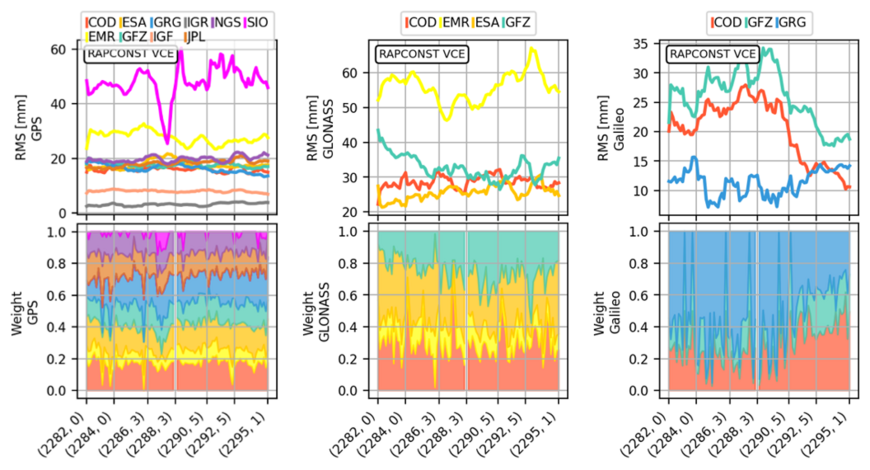GNSS Product Combination
The International GNSS Service (IGS) provides the global GNSS user community with highly accurate satellite orbits and clocks for GPS and GLONASS. These products are based on the combination of individual solutions provided by various analysis centers. To date, there has been no consistent combination of all satellite navigation systems, partly because the combination software used does not allow this. A homogeneous combination of all satellite navigation systems such as Galileo, BeiDou and QZSS requires, on the one hand, consideration of the system-specific modeling and, on the other hand, a modern concept for weighting the individual solutions. Since 2018, we have been developing new methods for a joint combination of all available satellite constellations. Our contributions so far are:
- Modification of the previous IGS "legacy" combination software for multi-GNSS (Sakic et al., 2018);
- Test and evaluation of the legacy combination strategy (Mansur et al., 2020);
- Development of a new combination procedure in which the weighting of the analysis center constellations is determined using variance component estimation methods (Mansur et al., 2022; Sakic et al., 2022; Mansur et al., 2024 (accepted)) and
- the development of a new combination software (Software for Precise Orbit and Clock Combination - SPOCC)
With our developments, we are making a significant contribution to the MGEX combination task force.
References
- Sakic, P., Mansur, G., Viegas, E., Männel, B., and Schuh, H. (2018): Towards a Multi-Constellation combination: Improving the IGS orbit & clock combination software for MGEX products, in: IGS Workshop, Wuhan, 2018.
- Mansur, G., Sakic, P., Männel, B., and Schuh, H. (2020): Multi-constellation GNSS orbit combination based on MGEX products, Advances in Geosciences, 50, 57–64. doi.org/10.5194/adgeo-50-57-2020
- Mansur, G., Sakic, P., Brack, A., Männel, B., & Schuh, H. (2022). Combination of GNSS orbits using least-squares variance component estimation. Journal of Geodesy, 96: 92. doi:10.1007/s00190-022-01685-y
- Sakic, P., Mansur, G., Männel, B., Brack, A., & Schuh, H. (2022). An Experimental Combination of IGS repro3 Campaign’s Orbit Products Using a Variance Component Estimation Strategy. In J. T. Freymueller, & L. Sánchez (Eds.), Geodesy for a Sustainable Earth (pp. 15-23). Cham: Springer. doi:10.1007/1345_2022_158
- Mansur, G., Brack, A., Sakic, P., Männel, B., Schuh, H. (2024) Utilizing least squares variance component estimation to combine multi-GNSS clock offsets. GPS Solut28, 70. doi.org/10.1007/s10291-023-01604-4
back to topic GNSS Infrastructure and Analysis



